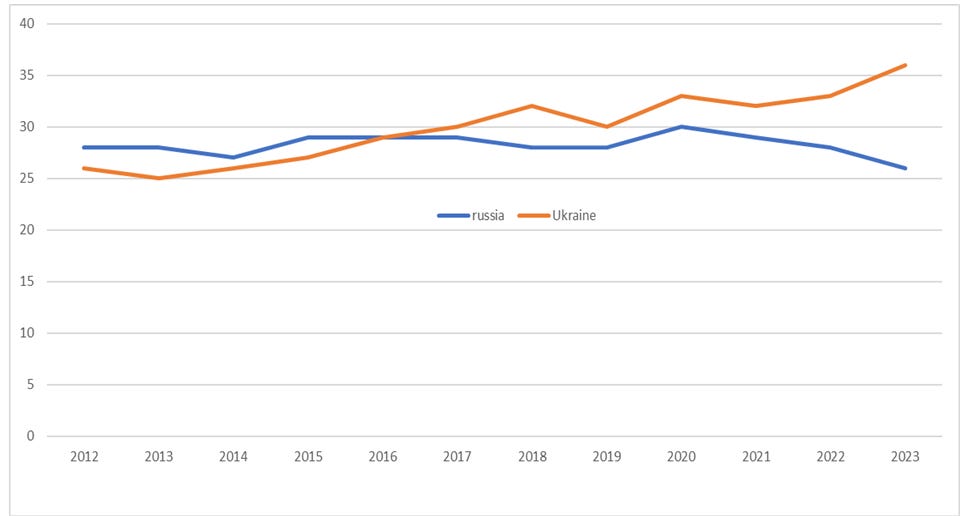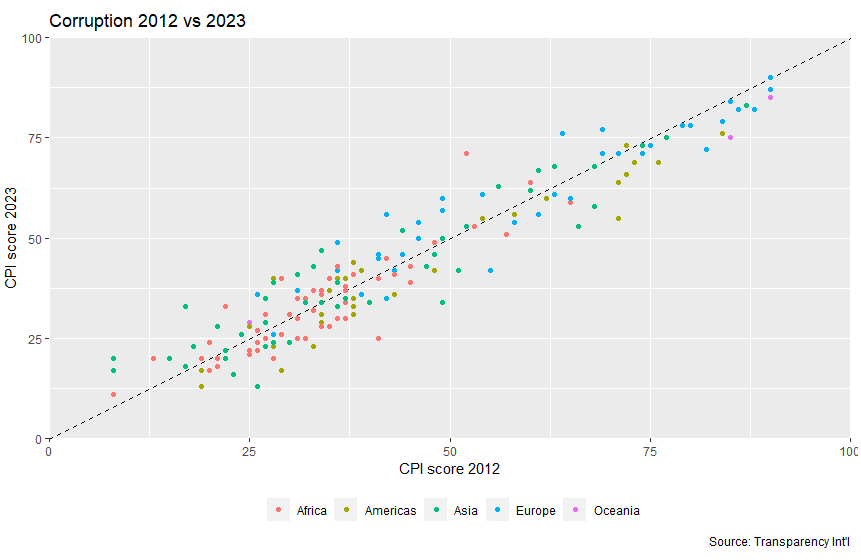A more corrupt and less democratic world
It is getting worse. Corruption increases also in democracies
Spoiler: It keeps getting worse. The trend towards a more corrupt world continues according to Transparency International (TI). It what one could expect given the democracy backlash that is ongoing. Autocratic regimes are more corrupt than democracies. But TI also reports some good news. One of these refers to Ukraine. Corruption is decreasing despite being attacked by the fascist regimes. Corruption in the fascist regime is getting worse from an already bad situation. Not surprising, since the fascist in chief has stolen so much from ordinaray muscovites that he now has at least four palaces with golden toilet brushes.
Unfortunately, corruption is increasing also in stable democracies as in Sweden. Sweden has consistently been regarded as free from corruption by Transparency International (TI) and other institutes. But it may be that corruption in Sweden has been underestimated by TI over the years. Sweden is more decentralised than most other countries. Many decisions that are made by national authorities in many countries are made by municipalities in Sweden. Corruption thrives in countries with a large public sector and bureacracy. Permits, inspections and procurement are bureaucratic processes that may provide incentives for corruption if they are not transparent enough.
All is not darkness. Ukraine defies the trend of more corruption. She has done so since the Maidan Revolution.
Ukraine fights the kremlin and corruption. The kremlin fights Ukraine but supports corruption
Let’s begin with the good news. Ukraina keeps fighting corruption despite having to fight a full-scale war. Second only to putin, Yanukovytch was the most corrupt political leader in Europe. Since Maidan, a number of anti-corruption laws and measures have been implemented in Ukraine. Even though muscovy’s full-scale war has forced Ukraine to roll back some of the reforms regarding public procurement, the development since Maidan is clearly positive.
Corruption has decreased in Ukraine since the Maidan revolution. It has increased in ruzzia during the little person’s reign.
Source: Transparency International
In the shithole country, aka ruzzia, corruption is pervasive. And it is worse than TI reports. TI’s measure does not include the systemic corruption inside the fascist army where soldiers are obliged to bribe their officers to avoid suicide missions.
Pay or die!
As the last bullet point concludes, corruption has long been a problem in the little person’s army. But the corruption does not end there. It is pervasive in the whole economy and very strong in the military industry which I wrote about here:
Putin’s corruption kills Ukrainian civilians and Russian soldiers.
Spoiler: Putin’s annihilation of Ukraine is not going according to his plan. He did not capture Kyiv within two days and did not manage to kill Zelenskyy. Anyone who daily keeps tracks of the Russian invasion of Ukraine, has seen how hard the brave Ukrainian people resist and causing many casualties in the Russian army, not to mention different kinds of…
The report from the World Peace Foundation nicely summarises the extent of corruption as follows:
“Today, corruption still constitutes a significant problem facing the Russian arms industry. This report discusses publicly available information on corruption in the Russian defense sector, especially the arms industry, identifying key cases of corruption that have become visible in recent years, in particular since 2008, when Russia’s current set of military reforms, and major rearmament drive, began.
Any discussion of corruption in Russia, including in the defense sector, must take into account the central role of corruption in the Russian state.”
Autocracies are more corrupt than democracies
ruzzia is not the only dictatorship with a pervasive corruption. In fact, most autocracies are characterised by strong corruption while the opposite in general is true for democracies. The graph below shows how stable this relationship was between 2000 and 2020. It has not changed much since then.
Since the world has become less democratic, it has has become more corrupt, also in democratic countries. Corruption has increased in many democratic countries since 2012 as well in North America, and Oceania.
Corruption increaces in democracies
All countries in the regions Australia and Nealand, Northern America and Northern Europe are democracies. Only in the three Baltic countries and Ireland has corruption been pushed back. It has increased or remained constant in the other ten countries in those regions. Measures to fight corruption have had impacts in Greece and Italy who accounted for the largest parts of the improved situtation in Southern Europe. Somewhat surprisingly did the largest improvement in Eastern Asia occur in North Korea. However, as the improvement occured from an extremely bad situation, the dictatorship is still the most corrupt country in the region.
Improvements in Asia, Southern Europe and Melanesia and detoriations in North America, Oceania, the Caribbean.
Source: Transparency International
Transparency International’s index, CPI, is not perfect. It has been criticised by quite a few, for example Andersson & Heywood. The index has been criticised for being a composite index based on a large number of surveys carried out by numerous different organisations trying to measure different things by different methods. However, by and large, its findings for countries over time corroborate the results of other attempt to measure corruption, such as the World Bank’s Control of corruption estimate.
Sweden is becoming more corrupt.
Another question is whether the CPI takes into account differences across countries w.r.t to how decentralised the political systems in different countries are. Sweden is very decentralised compared to most countries. Its 290 municipalities and 21 regions. The regions’ responsibilities comprise of health- and dental care, and transportation. The municipalities are responsible for social and elderly care, primary and secondary education, housing and planning, environment protection, waste and water management, and more. Together, municipalities and regions account for 70% of public consumption.
Source: Transparency International
That means that a lot of decisions and management of the public sector’s consumption takes place locally. The decisions refer to permits, inspections, procurements, outsourcing of services and more. There are often large amounts at stake in these decisions as they concern construction, and contracts for elderly and social care spanning several years. Also small business, such as restaurants, are dependent of the local authorities for permits and inspections of different issues.
Procurement of services and can offer the administrator in question an oppurtunity to get expensive for goods for free as the example in Ystad shows. Three administrators have been fired and await trial for taking bribes when procuring security services for Ystad municpality. As a result of the fraudelent procurement, security services in Ystad cost 43 millions SEK per year but only 7 millions in Kristianstad and even less in Trelleborg. Ystad is a small municipality of 32,000 compared to 87,000 and 47,000 in Kristianstad and Trelleborg respectively.
Outsourcing and sales of public property can also be very lucrative if handled in collusion with the sellers and buyers respectively. There are many examples of how sales of public property has been done without attentioin to rules of competions for requesting public announcement of the sales inviting several bidders. In 2009, Vellinge municipality sold its financial department to its chief without asking offering it on the market. Since then, the deparment transformed to a firm is managing the municipality’s invoicing and wages. Recently, an external consulting firm assessed Vellinge’s procurement practices. The firm found that Vellinge frequently violated the law on public procurement of public services. The findings were criticised by the chairman for Vellinge’s politically appointed auditors, Lars-Ingvar Ljungman. The same Ljungman who was responsible for the sale of the municipality’s sale of its financial department in 2009.










